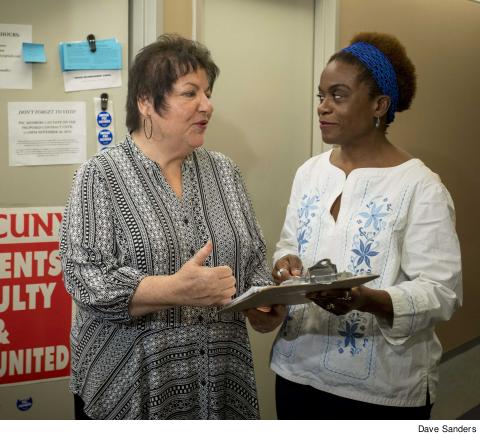Organizing HEOs locally
 |
Rank-and-file activists are bringing the union’s services directly to other members – and they’re seeing some positive results. When Judith Kubran, an Assistant to HEO, applied for the HEO salary differential, she found the process “demanding” and “overwhelming.” As an assistant program officer in the PhD program in psychology at the Graduate Center (GC), she is no stranger to completing complicated applications. But when she found out that PSC delegates at her campus were holding one-on-one HEO information sessions, she decided to check it out.
“My job and responsibilities have expanded a thousandfold since I started my position in 1985,” Kubran told Clarion. “I wanted to present the best possible package.”
LOTS OF PAPER
Applying for the $2,500 salary increase is a detailed, sometimes onerous process. Making a strong case requires assembling documents that describe increased responsibilities or excellence in performance and that can include supervisor recommendations, letters from colleagues, the original job description and a self-written job description that explains one’s actual responsibilities.
The provision for HEO differentials was won in 2016 when the PSC settled the 2010-17 PSC-CUNY contract. In the recently ratified PSC contract, the union secured matching funding for the salary differentials so that colleges will not have a financial reason to deny applications from eligible employees.
To apply, Assistants to HEO, HEO Assistants and HEO Associates have to be at the top of their salary schedule for at least one year. The union also won contractual time frames for responses to applications. The PSC bargaining team refused to settle the contract without agreement on time frames for HEO applications, and agreement was reached only on the last night of bargaining.
Starting January 1, 2020, HEOs who submit applications by January 1 for any year must receive a decision no later than June 30 of the same year; those who submit applications by July 1 must receive a decision no later than January 15 of the following year.
LEARNING SESSIONS
“We knew that applying for the differentials took time and many people would be intimidated by the process,” said Zee Dempster, a PSC HEO delegate at the GC who was part of the steering committee that organized the information sessions. “[Attending the sessions] makes members feel a greater connection with those representing them.”
PSC delegates at the Graduate Center began what they call HEO “office hours” last spring, where HEOs can learn about union campaigns and their rights and benefits from HEO delegates at the GC’s Midtown Manhattan building. They typically hold five or six one-hour sessions at the GC each semester. Dempster said that it is important to create an on-campus presence for the HEO chapter so that HEO delegates are accessible to their union coworkers.
“I like the office hours because people feel like they get responsiveness to their individual issues,” said Gerry Martini, an assistant director of admissions at the Graduate Center. “It allows us to connect with, and support, each other one-on-one in a great way, and it allows people to see how their union can help them with their own specific problems too.”
Martini added, “[The sessions] are great in terms of helping get colleagues the advice they need, and it is useful for camaraderie because it’s just another way we can show that we’re in it together. Pulling together helps with both individual and universal issues.”
Attending the HEO office hours is also easy. All Kubran had to do was and walk down the hallway during her lunch break. She came to the session prepared with documents and questions. Dempster, who was staffing the one-on-one session, helped Kubran prioritize and organize her documents.
“They’re there to advocate for you,” said Kubran, who found it helpful to have someone else to talk through the process with her. “It’s a way to empower people with information and action.”
And in the end, her application was successful. Her base salary increased by $2,500 a year and the raises from the new contract will be added to that.
HEO delegates in the Central Office chapter also began information sessions last spring.
“We are bringing the union to them,” said Lucy McIntyre, a Central Office delegate who developed the idea as part of her project with the PSC’s Next Generation Leadership Training. “We’re letting them know we’re here to represent you.”
McIntyre said union members come to the sessions with questions about potential grievances, union benefits and contract negotiations.
CORPORATE CULTURE
The Central Office chapter is scattered, with five different offices across the city. The chapter decided to hold their sessions twice a month at each site. McIntyre said that holding the one-on-one sessions for HEOs increases the union’s visibility at all CUNY Central Offices, where the work culture is more like a corporate environment.
At the GC, HEO delegates hope to get more people involved in being active in the chapter.
“At the larger meeting, we keep saying there is no ‘you’ and ‘us’ in a union,” said Dempster. She said the sessions help build personal relationships with the union. “It is breaking down those walls or barriers in a friendly way.”

